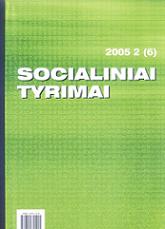Organizacijų mokymosi raiška vadybinėje praktikoje
The Expression of Orgnizational Learning in Managerial Practice
Author(s): Sigitas Balčiūnas, Rasa BalvočiūtėSubject(s): Social Sciences
Published by: VšĮ Šiaulių universiteto leidykla
Keywords: Orgnizational learning; managerial activities.
Summary/Abstract: In their recommendations researchers suggest the following means for the development of organisational learning (OL): learning environment, employees’ initiativeness, their dedication to learning and commitment for organisational goals, team working skills, etc. However, no empirical researches have been carried out to substantiate and evaluate these factors. The aim of the research is to study and describe organisational learning practices from the viewpoint of managerial activities and to disclose the link between learning environments of the organisation and the learners‘ personal characteristics significant for the learning process. Research methods – analysis of the scientific lit-erature, survey in the form of a questionnaire and methods of statistical analysis: descriptive statistics, validation of statistical hypothesis, correlation analysis, factor analysis. MS Excel and SPSS computer programs were used for the data processing. The paper presents the research, in which some practical aspects of OL have been revealed: 1)Description of the empirical research, the methoological basis of which was developed by Lahteenmaki Mattila and Toivonen in the research on OL (1997); 2)The research allows to state that executive officers and specialists of the organisation understand the necessity of learning in the changing environment, actively learn from their own and others experience and thus easily adapt to changes; 3)The comparative analysis of the employees’ skills necessary for their job and the learning methods employed for the development of those skills showed that the employed traditional learning methods not in all cases correspond to the development of the required skills; 4)The conclusion of the data factor analysis allowed determining 4 factors of OL development and evaluating of their interdependence. The first 2 factors evidence features of individual learning whereas the other 2 factors may be attributed to external factors. In the conclusion of the data factor analysis it was clarified that the closest direct interrelation exists between the learning environment and the employees’ active directness.
Journal: Socialiniai tyrimai
- Issue Year: 2005
- Issue No: 6
- Page Range: 5-11
- Page Count: 7
- Language: Lithuanian

